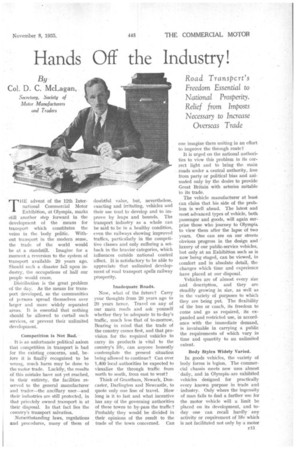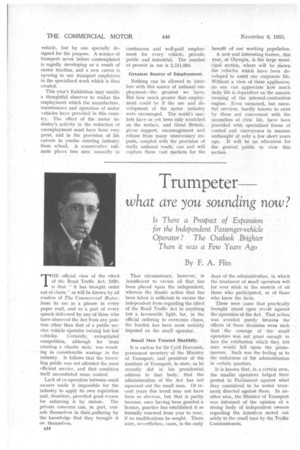Hands Off the Industry!
Page 135

Page 136

If you've noticed an error in this article please click here to report it so we can fix it.
By
Col. D. C. McLagan, T
. HE advent of the 12th Inter national Commercial Motor Exhibition, at Olympia, marks still another step forward in the development of the means for transport which constitutes the veins in the, body politic. Without transport in the modern sense, the trade of the world would be at a standstill. Imagine for a moment a reversion to the system of transport available 20 years ago. Should such a disaster fall upon industry, the occupations of half our People would cease.
Distribution is the great problem of the day. As the means for transport developed, so the communities of persons spread themselves over larger and more widely separated areas. It is essential that nothing should be allowed to curtail such services, or prevent their unlimited development.
. Competition is Not Bad.
It is an unfortunate political axiom that competition in transport is bad for the existing ,concerns, and, before it is finally recognized to be wrong, much harm may be done to the motor trade. Luckily, the results Of this mistake have not yet reached, in their entirety, the facilities reserved to the general manufacturer and trader—the ancillary user—and their industries are still protected, in that privately owned. transport is at their disposal. In that fact lies the country's transport salvation.
,Notwithstanding laws, regulations and procedures, many of them of doubtful value, but, nevertheless, exacting and irritating, vehicles and their use tend to develop and to improve by leaps and bounds. The transport industry as a whole can be said to be in a healthy condition, -even the railways showing improved traffics, particularly in the competitive classes and only suffering a setback in the heavier categories, which influences outside national control affect. It is satisfactory to be able to appreeiate that unlimited development of road transport spells railway prosperity.
Inadequate Roads.
Now, what of the future? Carry your thoughts from 20 years ago to 20 years hence. Travel on any of our main roads and ask yourself whether they be adequate to to-day's traffic, much less that of to-morrow. Bearing in mind that the trade of the country comes first, and that provision for the required vehicles to carry its product's is vital to the country's life, can anyone honestly contemplate the present situation being allowed to continue? Can over 1,400 local authorities be expected to visualize the through traffic from north to south, from east to west?
Think of Grantham, Newark, Doncaster, Darlington and Newcastle, to quote only one line of travel. How long is it to last and what incentive has any of the governing authorities of these towns to by-pass the traffic? Probably, they would be divided in their opinions of the result to the trade of the town concerned. Can
one imagine them uniting in an effort to improve the through route?
It is urged on the national authorities to view this problem in its correct light and to bring the main roads under a central authority, free from party or political bias and animated only by the desire to provide Great Britain with arteries suitable to its trade.
The vehicle manufacturer at least can claim that his side of the problem is well ahead. The latest and most advanced types of vehicle, both passenger and goods, will again surprise those who journey to Olympia to view them after the lapse of two years. One can see on our streets obvious progress in the design and luxury of our public-service vehicles, but only at an Exhibition such as is now being staged, can be viewed, in comfort and in absolute detail, the changes which time and experience have placed at our disposal.
Vehicles are of almost every size and description, and they are steadily growing in size, as Well as in the variety of purposes to which they are being put. The flexibility of the bus or coach, its freedom to come and go as required, its expanded and restricted use, in accordance with the immediate demand, is invaluable in carrying a public the requirements of which vary in time and quantity to an unlimited extent.
Body Styles Widely Varied.
In goods vehicles, the variety of body forms is legion. The commercial chassis meets new uses almost • daily, and in Olympia. are exhibited vehicles designed for practically every known purpose in trade and industry. Only where the ingenuity of man fails to find a further use for the motor vehicle will a limit be placed on its development, and today one can recall hardly any activity or requirement of life which is not facilitated not only by a motor
vehicle, but by one specially designed for the purpose. A science of• transport never before contemplated is rapidly developing as a result of motor traction, and a new career is opening to our transport employees in the specialized work which is thus created.
This year's Exhibition may enable a thoughtful observer to realize the employment which the manufacture, maintenance and operation of motor vehicles have provided in this country. The effect of the motor industry's activity in the reduction of unemployment must have been very great, and in the provision of life careers to youths entering industry from school. A conservative estimate places two men annually in continuous and well-paid employment for every vehicle, private, public and industrial. The number at present in use is 2,511,030.
Greatest Source of Employment.
Nothing can be allowed to interfere with this source of national employment—the greatest we have. But how much greater that employment could be if the use and development of the motor industry were encouraged. The world's markets have as yet been only scratched on the surface, and Great Britain, given support, encouragement and release from many unnecessary imposts, coupled with the provision of really national roads, can and will capture these vast markets for the benefit of our working population.
A new and interesting feature, this year, at Olympia, is the large municipal section, where will be shown the vehicles which have been developed to assist our corporate life. Without a view of these appliances, no one can appreciate how much daily life is dependent on the smooth running of the internal-combustion engine. Even unnamed, but essential services, hardly known to exist by those not conversant with the necessities of civic life, have been provided with specialized forms of control and conveyance in manner unthought of only a few short years ago. It will be an education for the general public to view this section.












































































































































































































































































































